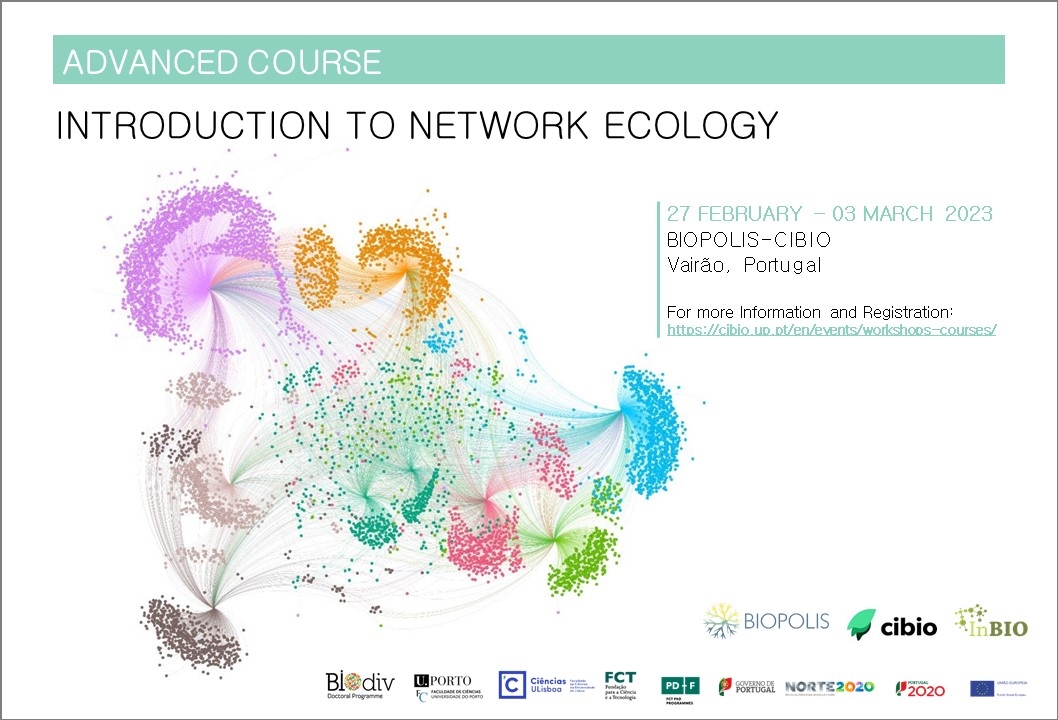Introduction to Network Ecology
Event
27 February - 3 March 2023
All organisms on Earth are connected to each other by ecological interactions, forming a complex web of life, the so-called ‘entangled bank’ coined by Charles Darwin. Network Theory brings concepts and tools that help to understand such complexity and to answer timely questions on ecology and conservation. This course aims to assist students to apply the science of Network Ecology to their research. It combines theoretical and practical classes with learning oriented by personal and group projects.
PROGRAM (32 hours)
Day 02 | February 28, 2023
Day 03 | March 01, 2023
Day 04 | March 02, 2023
February 27th, 2023
BIOPOLIS-CIBIO, Vairão, Portugal (Face-to-face)

27 February - 3 March 2023
All organisms on Earth are connected to each other by ecological interactions, forming a complex web of life, the so-called ‘entangled bank’ coined by Charles Darwin. Network Theory brings concepts and tools that help to understand such complexity and to answer timely questions on ecology and conservation. This course aims to assist students to apply the science of Network Ecology to their research. It combines theoretical and practical classes with learning oriented by personal and group projects.
PROGRAM (32 hours)
Day 01 | February 27, 2023
| 9:45-13:00
Introduction to the course
Theory class 1: History and Graph Theory
| 14:00-17:45Hands-on class 1: Drawing networks
Theory class 2: Network structure (metrics at the network/community level)
Day 02 | February 28, 2023
| 9:45-13:00
Hands-on class 2: Analyses at the network level
| 14:00-17:45
Hands-on class 2: Analyses at the network level
| 14:00-17:45
Theory class 3: Network structure (metrics at the node/species level)
Hands-on class 3: Analyses at the node level
Day 03 | March 01, 2023
| 9:45-13:00
Theory class 4: Biological bases and applicability
| 14:00-17:45
Talk 1: Trophic cascades (invited speaker)
Theory class 4: Biological bases and applicability
| 14:00-17:45
Talk 1: Trophic cascades (invited speaker)
Day 04 | March 02, 2023
| 9:45-13:00
Theory class 5: Metanetworks and species-habitat networks
| 14:00-17:45
Theory class 5: Metanetworks and species-habitat networks
| 14:00-17:45
Theory class 6: Multilayer networks
Hands-on 4: Preparation of the students' final projects/time for questions
Day 05 | March 03, 2023
| 9:45-13:00
Student projects – presentation and evaluation
Student projects – presentation and evaluation
COURSE INSTRUCTORS
STUDENTS EVALUATION
SELECTION CRITERIA
Ana Filipa Palmeirim (Coordinator) | BIOPOLIS/CIBIO-InBIO
Carine Emer | Rio de Janeiro Botanical Garden/Juruá Institute
Sérgio Timóteo | Centre for Functional Ecology - University of Coimbra
Luís P. da Silva | | BIOPOLIS/CIBIO-InBIO
ADMISSION REQUIREMENTS
Basic knowledge on R software (e.g., install packages, run scripts)
Read the suggested literature
Hold a laptop to run the analyses
Install the R software and/or R Studio on your computer
> Site to download R: http://cran.r-project.org
Students will be evaluated based on an individual, or small groups, presentation on the last day of the course, and on their participation as the audience. This will be carried on as a round-table, in which each student will present the results of the analyses of their own data, or from online databases. Presentations should follow the given structure:
(1) define the problem;
(2) elaborate a question and a hypothesis;
(3) choose which metric (s) and/or network properties are more appropriate to answer your question;
(4) present and discuss the results;
(5) elaborate a conclusion and/or applicability.
Presentation should follow the format of a "Science ou Elevator Pitch”, i.e., about five minutes to sell the message to the public. The format to give the message is free, so students should use their creativity. The audience is expected to be active, asking pertinent questions regarding the use, choice and applicability of the network theory/metrics to answer each students’ question.
Here you can find information about: Online databases/ Online courses and tutorials/ Books that are part of the course literature
SELECTION CRITERIA
The course will be open to a maximum number of 20 participants.
75% of available student slots are reserved for BIODIV students.
Priority will be given to:
• 1st year and other PhD students attending the BIODIV Doctoral Program;
• PhD students attending other courses;
• Other post-graduate students and researchers.
REGISTRATION
95€ (students) | 200€ (other participants). CIBIO-InBIO members will have an additional discount of 20%
Participation is free of charge for MBGE, BIODIV Students & CIBIO's TwinLabs
Participation is free of charge for MBGE, BIODIV Students & CIBIO's TwinLabs
Registration fees do not include accommodation or meals
Registration deadline extended: January 31, 2023
